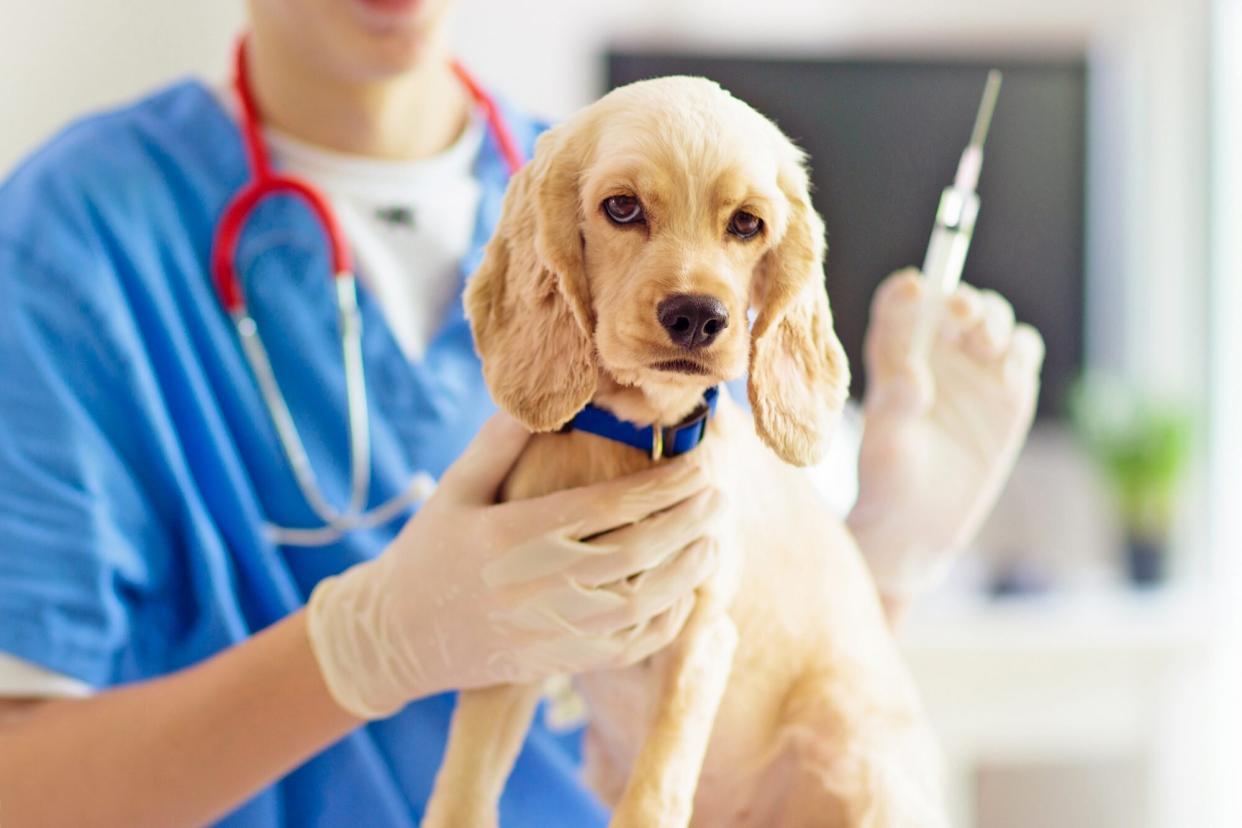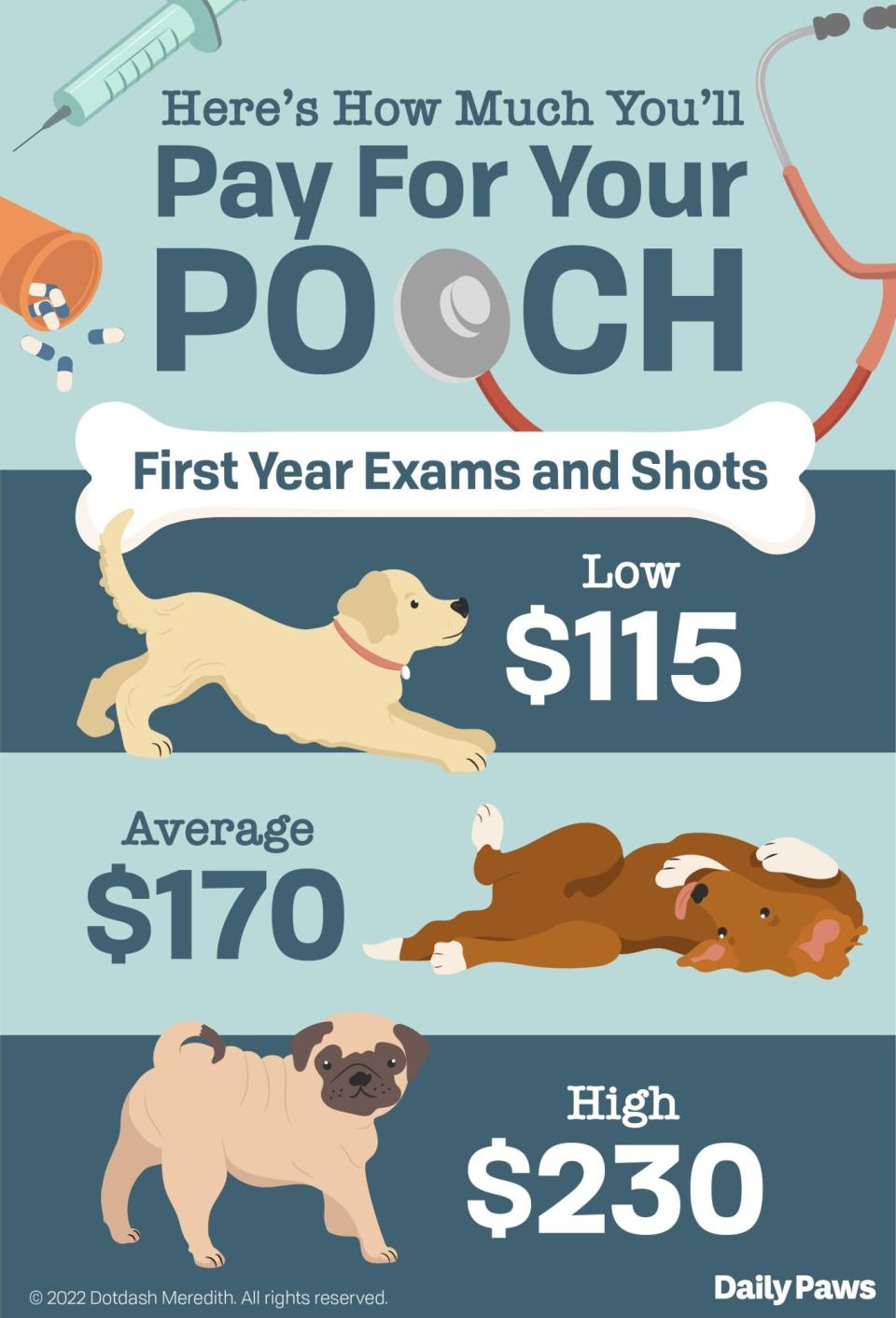Dog Vaccinations Cost: The Shots to Expect and How to Budget Accordingly

famveldman / Adobe Stock
TABLE OF CONTENTS
On This Page
Vaccination Costs
Cost of Additional Vet Services
Low-Cost Vaccination Clinics
Pet Insurance
You're tickled pink about your new pup and naturally want to keep them healthy for life. You probably also have an inkling about the overall costs of owning a dog, but one primary aspect to always budget for is your dog's vaccination cost and their annual veterinary exams.
In general, the highest fees you'll incur for dog vaccinations are in the first year, during which you could pay anywhere from about $100 to more than $200 depending on your puppy's needs and the prices in your area. After that, individual boosters will cost approximately the same but could be administered on a different cadence, depending on your dog's needs. Let's break out what you can expect to pay.
How Much Do Dog Vaccinations Cost?

Grace Canaan
Make sure to follow the vaccination series established by your vet, a process that starts when your pup is approximately 6–8 weeks old. Some vaccines are administered once at that time, but many have follow-up applications before the age of 16 weeks.
Bonnie Bragdon, DVM, MS, is co-founder and president of the Independent Veterinary Practitioners Association. She recommends three core vaccinations, usually given in stages as part of a puppy's vaccination schedule:
The DA2PP or DHPP series, also known as the "5–in–1 vaccine," protects against numerous highly contagious and often deadly viruses, including canine adenovirus types 1 and 2, distemper, parainfluenza, and parvovirus.
Leptospirosis is an infection caused by bacteria commonly found in water and soil. Technically, this is a non-core vaccine, but leptospirosis is a zoonotic disease, which means it's easily transmittable between animals and humans. "Because of this fact, I consider this a core vaccine and recommend it yearly," Bragdon says. Left untreated, leptospirosis causes permanent kidney and liver damage.
Rabies, another zoonotic disease, is considered the deadliest infectious disease in the world. Without prevention, rabies is almost always fatal.
"Lifestyle plays a role in personalizing preventive care plans. A hunting dog who travels is exposed to many dog diseases, parasitic infections, and other diseases. For this pet, frequent and full vaccination plus parasite preventives would be key," Bragdon says. "I choose to vaccinate my dogs who live outside annually rather than every three years because I worry about increased exposure."
Your veterinarian may recommend certain non-core vaccines based on your puppy's lifestyle. These may include:
Bordetella, also known as kennel cough, is a common respiratory infection that's highly contagious and might lead to pneumonia if left untreated. The vaccine is often administered in stages or as one shot with annual boosters. More social dogs, like those who can't get enough of the dog park, are often better protected with this.
H3N2 and H3N8 influenza, frequently called the "canine flu," is another recommended dog vaccine for pups who compete in show competitions or sporting events, attend doggy daycare, or are boarded frequently. Similar to the human flu shot, this vaccine might not completely prevent your pet from getting canine flu, but it should lessen the symptoms and prevent the onset of pneumonia.
Bragdon adds some canines might also require the Lyme vaccine as a precautionary measure, even though it's technically a non-core vaccine. Your vet may advise it for hiking or hunting dogs, farm or herding dogs, or those who live in high-risk tick endemic areas, such as the Northeastern United States, Minnesota, and Wisconsin.
"Tick protection is just as important as vaccination in protecting against the disease," she adds.
As you and your vet develop a preventative care plan, make sure to clarify how much dog vaccinations cost when first performed as well as the cost and frequency of any boosters. Overall, a veterinarian's fees vary based on their location and competitors' costs—and the particular needs of your pup.
RELATED: Understanding Puppy Shots: All the Vaccinations Your New Pup Will Need in Their First Year
Dog Vaccination Costs Summary
For your dog's first-year vaccinations, you can expect to pay a low average of $115, a middle average of $170, and a high average of $230. The eventual cost depends on the dog, where you live, and the shots they need. (You may adopt a puppy after they received their first round of vaccines, for example.)
On average, here's what your dog's vaccinations each cost in the first year:
DHPP: $20–$60
(and again for follow-up applications within the first year)Leptospirosis: $20–$30
(and again for follow-up applications within the first year)Rabies (one year): $20–$30
Bordetella: $30-50
Canine influenza: $45-65
Lyme: $20–$40
(if recommended, and follow-up applications within the first year)
Separate from the shots, you can also expect to pay $30–$50 for your dog's initial exam.
Separate from the shots, you can also expect to pay $30–$50 for your dog's initial exam (again, this depends on location—some regions have average exam fees of $80-100).
In your puppy vaccination schedule, there will also be boosters—which cost about the same as the initial shots—for some of these vaccines by the time they're 16 weeks old. A healthy puppy may not need another exam at booster visits, but this depends on the practice and veterinarian's recommendations, according to Jenna Stregowski, RVT and Daily Paws' health and behavior editor.
Dogs will undergo their first annual exam as an adult one year after their 16-week checkup, and that may include updates to their core vaccines, Stregowski says.
While some vaccines follow a three-year schedule, others have annual boosters based on either your vet's recommendations or state law. For example, some states permit a rabies shot every three years, while others require it once a year. A booster for a rabies vaccine costs $35–$50.
Cost of Additional Vet Services
Your pup's health isn't dependent on only vaccines, of course. There's a host of other services you'll want to consider from your pup's first year and onward.
During a puppy's first or second checkup, Stregowski says your vet will also likely recommend flea and tick protection, heartworm testing and prevention, and a fecal exam to check for intestinal parasites such as roundworms and hookworms.
You can expect the approximate cost for additional services in the first year to be:
Heartworm test: $25–$50
Fecal exam: $20–$40
Flea and tick prevention: $40–$200
Heartworm prevention: $25–$120
Deworming: $25–$130 (many vets still deworm as not all fecal exams show parasites even when present)
(if necessary)
The heartworm test and fecal exam will be recurring practices at your dog's vet visits throughout their life, Stregowski says. But vets will do more to ensure your dog stays healthy. "It's also important to note that some vets recommend annual screening laboratory work even before pets reach senior age," she says. "These panels can run $100–$400, with the higher range covering more comprehensive senior lab work."
Are There Low-Cost Dog Vaccinations Near Me?
When you adopt a dog from a rescue or shelter, most have already received at least their first round of vaccinations. However, Stregowski says veterinarians recommend still scheduling a clinic visit the first week you have your new dog. That way you make sure your pup is still healthy and plan for any necessary boosters. Occasionally, organizations might have a voucher for a free or discounted follow-up exam for pet parents at the vet of their choice.
But sometimes budget constraints make it difficult to keep up. Bragdon suggests researching local municipal animal control services and private nonprofits to see what temporary assistance might be available. In special circumstances, such as with unhoused people and their pets, many veterinary organizations band together a few times a year to offer free vaccinations and checkups. And often local rescues partner with veterinarians to provide community outreach services.
RELATED: The Best Pet Wellness Plans That Cover What Insurance Won't
Veterinary schools occasionally have free or low-cost vaccination clinics, too, and most vets offer wellness payment plans and "vaccines for life" programs with prior enrollment. Additionally, The Humane Society of the United States provides an extensive list of resources that could help with dog vaccination costs.
Bragdon says you can also save a little on expenses by asking your vet for longer-duration vaccines, if available (it depends on the vaccine). You'll pay more upfront, but the doses are less frequent. Regardless, both Bragdon and Stregowski strongly recommend always scheduling an annual exam.
Does Pet Insurance Help?
It depends on the policy—and you'll have to really crunch the numbers. Pet insurance is certainly an option for emergency or surgical coverage, but unless the policy has a specific wellness plan—which might be available for a higher monthly premium—it's unlikely to cover vaccination costs. It might be more attainable to simply create a separate savings account for pet healthcare expenses.

